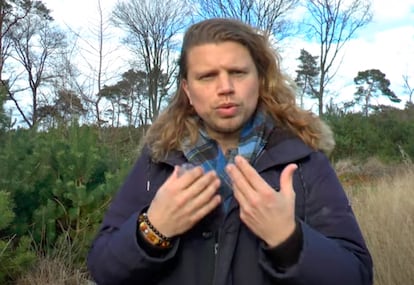Dutch serial sperm donor: ‘I am not a mad bull with an urge to procreate’
Jonathan M., a sperm donor who may have fathered 550 children, has been sued by a mother and a foundation that connects children and siblings born through artificial insemination


He’s tall, with blue eyes and long, blond hair. Jonathan M., the 41-year-old Dutch sperm donor who may have fathered 550 children, appeared in court in The Hague on April 14 to face a lawsuit filed by Eva, a mother who gave birth with sperm donated by Jonathan M. It’s the first legal case of its kind in the Netherlands. The lawsuit alleges that Jonathan M. deceived Eva by not disclosing that he had potentially fathered over 25 children; the maximum allowed for this type of birth. Eva is asking the court to prohibit him from donating more sperm to fertility clinics. Jonathan feels he is unfairly labeled as “a mad bull with an urge to procreate,” and said such a ban would be tantamount to “a serious attack on his person.” His lawyer described it as “an attempt at legal castration.” Donorkind, a Dutch foundation that facilitates contact between donor siblings, has joined Eva’s lawsuit and a court ruling is expected on April 28.
The courtroom for the hearing filled up quickly and officials scrambled to set up another place for the overflow audience. A tanned Jonathan M. told the court that he was “vaccinated and very healthy,” and described himself as a “well-known donor plus.” He said donating sperm was “a job… a service with added value” because he welcomes contact with his offspring and attends births, birthdays and school graduation ceremonies. However, the foundation Donorkind calls it “a bizarre social experiment” that should be ended immediately and asked the court to impose a €100,000 ($110,000) fine for each violation of the ban in the Netherlands or other countries.
The lawsuit also demanded the destruction of all of Jonathan M’s unused sperm stored in fertility clinics unless a woman who has had children by him wants a biological sibling. Donorkind’s president, Ties van der Meer, told EL PAÍS, “We believe the judge understands that the interests and futures of these minor children must prevail.” In 2017, the Dutch Association of Obstetricians and Gynecologists alerted authorities that Jonathan M had already fathered 102 children through sperm donated to 11 fertility clinics.
Jonathan M. told the court he no longer actively promotes his donation services on the internet, but said he would oblige parents who want a second or third child. He doesn’t want to be “the face of mass sperm donors,” and worries about being blackmailed. His lawyer, Richard van der Zwan, argues that his client’s body is his own, and” just like people who have a right to an abortion or euthanasia, he has a right to procreate.” When the judge asked if he thought “500 or 600 siblings could establish fraternal bonds”, the defendant answered, “That depends on the parents. It’s a new concept, and it is up to us — the adults — to shape it.”
Jonathan M. believes the real reason for the lawsuit is that Donorkind wants to make a documentary about it for Netflix. Ties van der Meer said, “We know some people are producing a documentary, and we’ve asked to be a part of it. But it’s not our production.” Mark de Hek, Donorkind’s lawyer, told the court that there are “seven pregnant women [from this donor] and several more with young children who just learned the ramifications of this case.” Jonathan promised expectant mothers that he would not exceed the 25-child legal limit in the Netherlands, which is one reason Eva, the plaintiff, chose him as the biological father of her child. Now that this lie has been exposed, Eva says she wants to protect her child’s future and worries about the child’s mental health.
Anonymous sperm donations were banned in the Netherlands in 2004, and a national registry with relevant donor information was established. This includes data on physical characteristics, marital status, previous children, personality (creative, introverted, etc.), along with the donor’s surname, date of birth and place of residence. The data is maintained for 80 years and children can access it when they’re 16. But fertility clinics do not exchange information, so Jonathan’s prolific sperm donations were belatedly discovered in 2017. Many women who used his services came forward at that point, but his semen had already been in use for years in several countries.
According to the Dutch registry, regulations allow the donation of sperm, eggs and embryos to “heterosexual and lesbian couples, and single women.” Payments to donors should only cover travel expenses. Until 2019, a maximum of 25 children per donor was allowed to avoid the risk of unknowing incest between siblings who could meet later in life.
After 2019, the restriction was changed: a man could only donate to 12 women. Because the recipient mothers usually have only one or two children, the outcome is approximately the same – a maximum of 25 children. Children conceived between 1990 and 2004 before the registry was created also have access, although data from that period is spotty. The best way for them to identify siblings is with DNA testing. In June 2022, Donorkind received 1,415 requests for donor information.
Sign up for our weekly newsletter to get more English-language news coverage from EL PAÍS USA Edition
Tu suscripción se está usando en otro dispositivo
¿Quieres añadir otro usuario a tu suscripción?
Si continúas leyendo en este dispositivo, no se podrá leer en el otro.
FlechaTu suscripción se está usando en otro dispositivo y solo puedes acceder a EL PAÍS desde un dispositivo a la vez.
Si quieres compartir tu cuenta, cambia tu suscripción a la modalidad Premium, así podrás añadir otro usuario. Cada uno accederá con su propia cuenta de email, lo que os permitirá personalizar vuestra experiencia en EL PAÍS.
¿Tienes una suscripción de empresa? Accede aquí para contratar más cuentas.
En el caso de no saber quién está usando tu cuenta, te recomendamos cambiar tu contraseña aquí.
Si decides continuar compartiendo tu cuenta, este mensaje se mostrará en tu dispositivo y en el de la otra persona que está usando tu cuenta de forma indefinida, afectando a tu experiencia de lectura. Puedes consultar aquí los términos y condiciones de la suscripción digital.








































